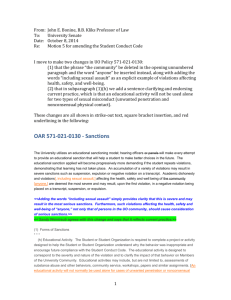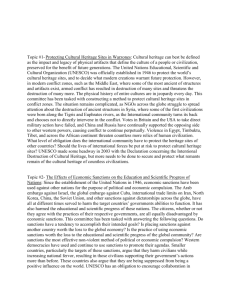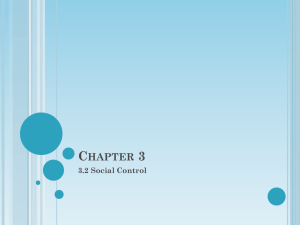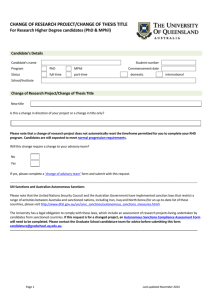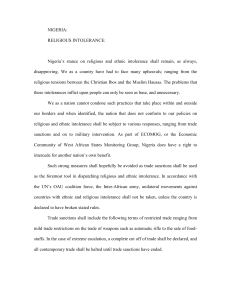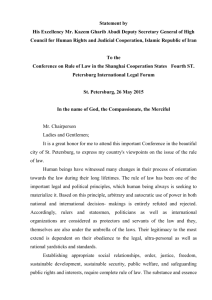Minutes on the UN Sanctions in Africa event
advertisement
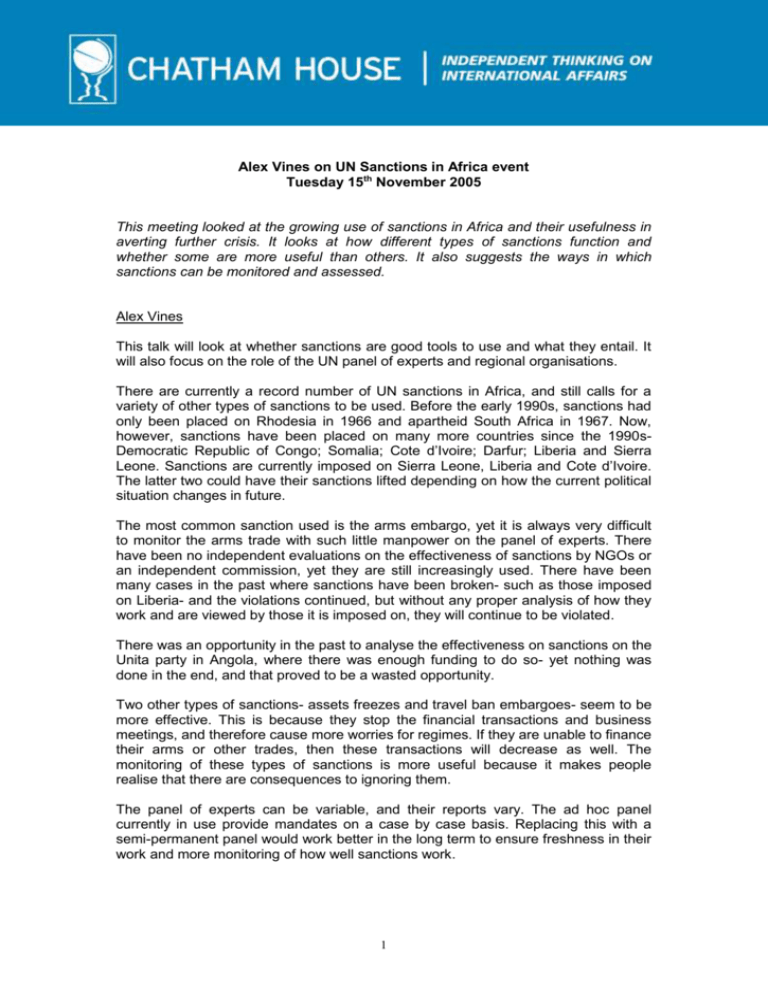
Alex Vines on UN Sanctions in Africa event Tuesday 15th November 2005 This meeting looked at the growing use of sanctions in Africa and their usefulness in averting further crisis. It looks at how different types of sanctions function and whether some are more useful than others. It also suggests the ways in which sanctions can be monitored and assessed. Alex Vines This talk will look at whether sanctions are good tools to use and what they entail. It will also focus on the role of the UN panel of experts and regional organisations. There are currently a record number of UN sanctions in Africa, and still calls for a variety of other types of sanctions to be used. Before the early 1990s, sanctions had only been placed on Rhodesia in 1966 and apartheid South Africa in 1967. Now, however, sanctions have been placed on many more countries since the 1990sDemocratic Republic of Congo; Somalia; Cote d’Ivoire; Darfur; Liberia and Sierra Leone. Sanctions are currently imposed on Sierra Leone, Liberia and Cote d’Ivoire. The latter two could have their sanctions lifted depending on how the current political situation changes in future. The most common sanction used is the arms embargo, yet it is always very difficult to monitor the arms trade with such little manpower on the panel of experts. There have been no independent evaluations on the effectiveness of sanctions by NGOs or an independent commission, yet they are still increasingly used. There have been many cases in the past where sanctions have been broken- such as those imposed on Liberia- and the violations continued, but without any proper analysis of how they work and are viewed by those it is imposed on, they will continue to be violated. There was an opportunity in the past to analyse the effectiveness on sanctions on the Unita party in Angola, where there was enough funding to do so- yet nothing was done in the end, and that proved to be a wasted opportunity. Two other types of sanctions- assets freezes and travel ban embargoes- seem to be more effective. This is because they stop the financial transactions and business meetings, and therefore cause more worries for regimes. If they are unable to finance their arms or other trades, then these transactions will decrease as well. The monitoring of these types of sanctions is more useful because it makes people realise that there are consequences to ignoring them. The panel of experts can be variable, and their reports vary. The ad hoc panel currently in use provide mandates on a case by case basis. Replacing this with a semi-permanent panel would work better in the long term to ensure freshness in their work and more monitoring of how well sanctions work. 1 Atabou Bodian The other types of sanctions- such as embargoes placed on timber and diamond trades- have a more personal effect on the population. In Liberia, for instance, trade embargoes left many people jobless, even though the point of sanctions is to change the mind of the leaders. Therefore one needs to consider the negative aspects sanctions have on the community for people who work in the industries with embargoes. Q&A session Q. Is there any point in going after Victor Bout (arms trafficker)? A. People in the arms trade industry work with a variety of clients, and they get special protection from them. However, Bout has a travel embargo placed on him, and is unable to travel do to pro-activity of UN work. Q. How can one monitor the impact sanctions have on a country? How can one make a distinction between the real aims of sanctions and its actual impact? A. The mandate for monitoring the drafting of reports is a problem. The OHCA have devised a toolkit to monitor sanctions, which is a useful kit to use. The unintended impacts of sanctions are that it affects the poor. For instance, the timber and diamond embargoes in Liberia could be lifted once there is a system of certifying the origins of the products, similar to the system used in Sierra Leone. Q. If the UN were to place sanctions on Cote d’Ivoire, what sanctions could be used? A. There is a list of people the UN member states are threatening to impose a travel ban on. This type of sanction would most certainly cause concern for the people in Cote d’Ivoire. Q. What is the assessment of imposing asset freezes? A. Asset freezes on non-state actors, such as rebel groups, are difficult to monitor. In Angola, for instance, rebel groups had assets in commodities, and not money, so it was harder to track. However, there is more cooperation on sharing financial data amongst member states since 9/11. Q. The EU has imposed a number of sanctions on various countries (e.g. Zimbabwe), even though the UN have not imposed any. What about the role of regional organisations? A. There needs to be a consensus amongst regional and international bodies on what measures can be taken. Q. Can sanctions be agreed on without any assessment on how effective they are? A. The International Peace Academy and various other NGOs are working on analysing the effectiveness of sanctions Q. How can failed states develop after having so many sanctions imposed on them? 2 A. There needs to be a regional and continental approach on what can be done, rather than always choosing to impose sanctions. 3


